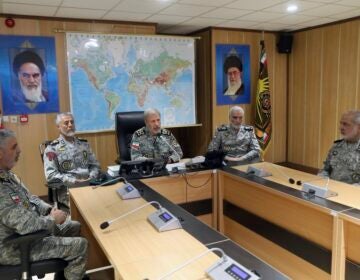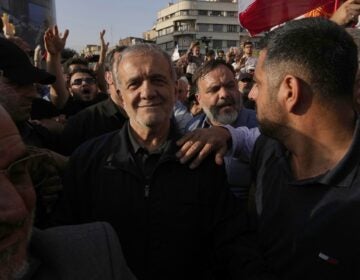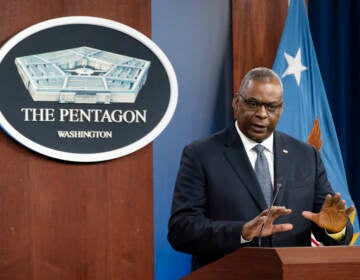Pentagon: 34 US troops had brain injuries from Iran’s strike
Seventeen of the 34 are still under medical observation, according to Jonathan Hoffman, the chief Pentagon spokesman.

Defense Secretary Mark Esper arrives to brief members of the Senate on the details of the threat that prompted the U.S. to kill Iranian Gen. Qassem Soleimani in Iraq, Wednesday, Jan. 8, 2020 on Capitol Hill in Washington. (AP Photo/ Jacquelyn Martin)
The Pentagon said Friday that 34 U.S. troops were diagnosed with traumatic brain injuries suffered in this month’s Iranian missile strike on an Iraqi air base, and that half of the troops have returned to their military duties.
Seventeen of the 34 are still under medical observation, according to Jonathan Hoffman, the chief Pentagon spokesman.
President Donald Trump had initially said he was told that no troops had been injured in the Jan. 8 strike. The military said symptoms were not immediately reported after the strike and in some cases became known days later.
After the first reports that some soldiers had been hurt, Trump referred to them as “headaches” and said the cases were not as serious as injuries involving the loss of limbs.
Hoffman’s disclosure that 34 had been diagnosed with traumatic brain injury, or TBI, was the first update on the number injured in Iran’s missile attack on Ain al-Asad air base in western Iraq since the Pentagon said on Jan. 17 that 11 service members had been flown out of Iraq with concussion-like symptoms. Days later, officials said more had been sent out of Iraq for further diagnosis and treatment, but the Pentagon did not provide firm figures on the total or say whether any had been returned to duty.
Hoffman said that of the 34 with TBI, 18 were evacuated from Iraq to U.S. medical facilities in Germany and Kuwait, and 16 stayed in Iraq. Seventeen of the 18 evacuees were sent to Germany, and nine remain there; the other eight have been transported to the United States for continued observation or treatment.
The one American sent to Kuwait has since returned to duty. All 16 of those who were diagnosed with TBI and remained in Iraq have since returned to duty, Hoffman said.
No one was killed in the attack on Ain al-Asad. The strike was launched in retaliation for a U.S. drone missile strike that killed Qassem Soleimani, the most powerful military general in Iran, on Jan. 3 at Baghdad International Airport.
Trump has repeatedly claimed that no Americans were harmed in the missile strikes, an outcome that he said drove his decision not to retaliate further and risk a broader war with Iran. He credited the minimized damage to an early warning system “that worked very well” and said Americans should be “extremely grateful and happy” with the outcome.
Some members of Congress this week pressed the Pentagon for more clarity on the scope of the TBI cases resulting from the Iranian attack. Rep. Bill Pascrell, D-N.J., wrote senior Pentagon officials on Thursday requesting additional details on casualties from the attack.
On Friday morning, Defense Secretary Mark Esper directed the Pentagon’s acting undersecretary of defense for personnel and readiness, Matthew Donovan, to begin working with the staff of the Joint Chiefs to review how military injuries are tracked and reported — not just TBI cases but battlefield injuries of all kinds, Hoffman told reporters.
“The goal is to be as transparent, accurate, and to provide the American people and our service members with the best information about the tremendous sacrifices our warfighters make,” Hoffman said.
WHYY is your source for fact-based, in-depth journalism and information. As a nonprofit organization, we rely on financial support from readers like you. Please give today.




